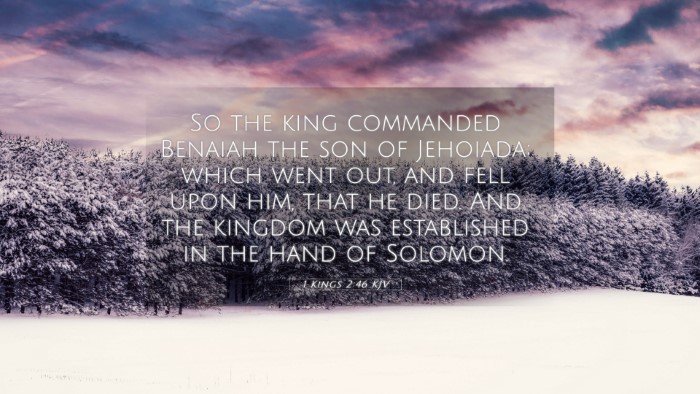Understanding 1 Kings 2:46
Verse Reference: 1 Kings 2:46
Verse Text: "So the king commanded Benaiah, the son of Jehoiada; and he went out, and fell upon him, that he died. And the kingdom was established in the hand of Solomon."
Overview
This passage from 1 Kings highlights a significant moment in Solomon's transition to power. Following King David's death, Solomon must take decisive action to secure his reign and consolidate his authority over Israel. The narrative emphasizes themes of justice, authority, and the establishment of the monarchy.
Commentary Insights
-
Matthew Henry:
Henry emphasizes the importance of Solomon's actions in purging the kingdom of threats to his rule. The execution of Adonijah is seen as both a political necessity and an act of justice, establishing Solomon's authority as the new king appointed by God. It shows Solomon's commitment to God's covenant and the necessity of eliminating rival claims to power.
-
Albert Barnes:
Barnes notes that this execution reinforces Solomon's strength and determination to rule. He points out that Solomon's actions fulfill the prophecy and divine guidance he received, as well as demonstrate his loyalty to David's legacy and adherence to the covenant established with Israel.
-
Adam Clarke:
Clarke discusses the moral implications of Solomon's command and the harsh realities of leadership. He articulates the idea that Solomon's rule must be built on righteousness and justice, drawing attention to the complexities of establishing a monarchy amidst previous rivalries and dissent.
Thematic Connections
- Authority and Justice: The need for Solomon to assert his authority through decisive actions relatable to other scripture that discusses leadership and accountability (e.g., Romans 13:1-4).
- Divine Guidance: The notion that rulers are established by God connects this verse with passages concerning divine ordination of kings (e.g., 1 Samuel 10:1).
- Transition of Power: This moment underscores the struggles associated with taking over a kingdom, akin to themes found in 2 Samuel 5:1-5.
- Covenant Continuity: Solomon’s actions represent continuity in the covenant God made with David, linking back to 2 Samuel 7:12-16.
- Rivalry and Conflict: The elimination of threats is a recurring theme in kingship narratives, relating to earlier struggles in the books of 1 Samuel (e.g., Saul's pursuit of David).
Bible Cross References
Here are several Bible verses related to 1 Kings 2:46, showcasing the connections between biblical texts:
- 2 Samuel 7:12-16
- 1 Kings 1:5-7
- 1 Kings 3:21
- 1 Chronicles 29:23
- Proverbs 20:28
- Matthew 12:25
- Romans 13:1-4
Connecting Themes in Scripture
The analysis of 1 Kings 2:46 allows us to explore broader biblical themes through inter-Biblical dialogue, particularly regarding leadership, justice, and the fulfillment of God’s divine plan. Exploring how these themes recur aids in understanding not just the narrative at hand but also the overall tapestry of scripture.
Tools for Cross-Referencing
Utilizing a Bible concordance or cross-reference guide can be invaluable in tracing these thematic connections:
- Bible Concordance: A tool that provides a comprehensive index of scripture references.
- Bible Cross-Reference System: A structured approach to identifying related verses across both Testaments.
- Cross-Reference Bible Study: Methods that help in linking Bible scriptures for thematic analysis.
- Identifying Connections: Resources that aid in uncovering links between Old and New Testament passages.
Conclusion
1 Kings 2:46 is a pivotal moment that underscores the importance of justice, divine ordination, and the establishment of Solomon's rule. By understanding this verse within its narrative context and through the lens of cross-referencing with other biblical texts, we gain a deeper insight into the complexities of scripture and the unfolding historical narrative of God's people.






